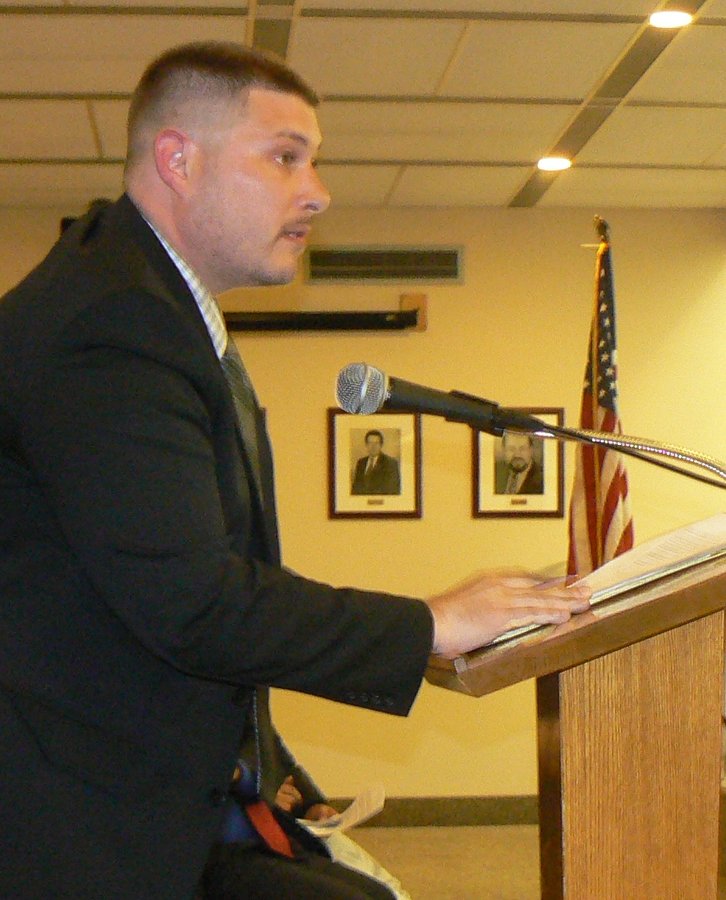Business Administrator Joseph DeMarco sees the $131 million 2015 Bayonne municipal budget as not only the city’s financial document of record for the current year, but also as a blueprint for the future. The goal is to close the gap in the city’s structural deficit, a recurring annual debt which was $24 million last year and is estimated to be about $20 million this year.
At the City Council’s April 22 meeting, city administrators confirmed what had been reported the month before: that taxes will go up in Bayonne 2.9 percent in 2015.
At the council’s March 18 meeting, Chief Financial Officer Terrence Malloy announced the tax hike, saying that for too long Bayonne had relied on non-recurring revenue, or “one-shot fixes,” in trying to avoid tax increases. Malloy gave a primer on how the city got where it is, and where it needs to go stay solvent.
With long-sought development deals seemingly being completed, DeMarco and Mayor James Davis believe Bayonne could be turning the corner to economic stability.
By settling the three outstanding lawsuits at the former Military Ocean Terminal, Bayonne now has the opportunity to collect tax on properties owned for 15 years.
DeMarco said that with this new infusion of revenue the city hopes to keep chipping away at the structural deficit, maybe getting it down to $18 million or $17 million in two years.
In the meantime, he’s optimistic that with only a 2.9 percent tax increase in this year’s budget, Bayonne residents will be served well.
“There are no cuts in services or programs,” DeMarco said. “There’s no cut in anything. All essential services are still the same.”
Senior, parks, and recreation programs will be funded and maintained, he said.
The city is able to do this through a series of measures this year. One was the renegotiation with McCabe Ambulance Service for the city emergency services contract. What had been a $600,000 fee paid by the city was lowered to zero after owner Mickey McCabe agreed to have the contract rebid. McCabe’s will derive income solely from insurance payments for calls.
Restructuring of the city debt resulted in savings of $400,000 to $500,000 a year.
Asking city employees to contribute to their health care plans rerouted about another $300,000 back into city coffers.
Those three changes alone resulted in between $1 million and $1.5 million saved by the city.
On the revenue side, there is the 2.9 percent tax increase; unwanted, but not outlandish. Money left over from the Bayonne Municipal Utility Authority’s water deal, about $11 million for property tax relief, will be moved over to the municipal budget. Land sales proceeds from The Peninsula at Bayonne Harbor will also help the city’s cause.
With development growth comes recognizable benefits. Increased activity in the Building Department and Planning Board areas means more revenue from fees and funds in escrow accounts, according to DeMarco.
“There’s a big increase in permit fees and application fees and all those things,” he said. “These go right into offsetting operating costs.”
DeMarco noted that last year for the first time since 2010 the city did not take out tax anticipation notes, or “TANs,” mid-year borrowing by cities to shore up their finances until all revenue believed coming into a city is due, by year’s end.
“We made 12 months of revenue last 12 months,” he said.
Some questions
But administration critics are not so sure the budget is a work of art.
City resident Peter Franco again questioned why any hiring at all was done by the current administration since the city is in such tough times economically.
“Overall the biggest thing they talk about is the structural deficit. We come in $24 million in the hole. We can’t pay our bills,” he said. “So when you hire more people, the money has to come from somewhere.”
Longtime city hall watcher Leonard Kantor, who ran against Davis administration council members, but then later endorsed them, also questioned items in the 2015 budget.
He is concerned that the last $11 million set aside for property tax relief from the United Water Deal will now be gone after 2015.
“That’s been a big thing in the budget, that $11 million,” Kantor said. “But after this year, you don’t get that anymore. If you don’t have that there, you have to find $11 million next year.”
Kantor said he was disappointed in the income related to the parking utility, saying that the city does not make much from that revenue stream, paying out about $1 million, and only making about that in return.
Kantor did see some positive signs in the budget, including taking in about $10 million in payments and fees associated with building in the city. He also praised the administration for keeping salaries and wages relatively low, only raising them about $370,000 from $66 million to $67 million-plus.
Property taxes
Since the average Bayonne home is assessed at $125,170, the budget will raise property taxes on the average Bayonne home by $128.93 on an annual basis, according to Malloy.
The municipal budget is being reviewed and discussed; a June adoption is anticipated.
Joseph Passantino may be reached at JoePass@hudsonreporter.com.To comment on this story online visit www.hudsonreporter.com.
